 Bishop Barron翻译|Carrie2018-7-20四部福音书三番五次地描写了耶稣违反在第七日休息这个神圣诫命的行为。比如说,祂经常在安息日治愈病人,令护卫犹太律法的人们惊恐不安。今天的福音中,耶稣的门徒在安息日掐麦穗吃,然后祂宣布自己是“安息日的主”。在公元一世纪时,一个犹太人作出如此声称,那种惊心动魄的程度真是难以言表。只有雅威才能配得上“安息日的主”这个称号,那么耶稣在暗示什么呢?简而言之,耶稣宣称的是,因为祂是上主,所以祂凌驾于礼仪之上,甚至高于虔诚犹太人的定义性习俗。因此,规章惯例必须隶属于天国,而此时此刻这个天国正在主耶稣的引领下进入人间。Again and again in the Gospels, Jesus is portrayed as violating the sacred command to rest on the seventh day. For example, he often cures on the Sabbath, much to the dismay of the protectors of Jewish law.And then in today’s Gospel, after his disciples pick grain on the Sabbath, Jesus declares himself “Lord of the Sabbath.” It’s hard to express how breathtaking this claim would be for a first-century Jew to make. Yahweh alone could be assigned the title “Lord of the Sabbath,” so what is Jesus implying?In short, he is claiming that he is above their rituals, even perhaps the defining practice of pious Jews, because he is the Lord. Thus the rules must be placed in subordination to the kingdom of God, the kingdom that the Lord Jesus is ushering in even here and now.
Bishop Barron翻译|Carrie2018-7-20四部福音书三番五次地描写了耶稣违反在第七日休息这个神圣诫命的行为。比如说,祂经常在安息日治愈病人,令护卫犹太律法的人们惊恐不安。今天的福音中,耶稣的门徒在安息日掐麦穗吃,然后祂宣布自己是“安息日的主”。在公元一世纪时,一个犹太人作出如此声称,那种惊心动魄的程度真是难以言表。只有雅威才能配得上“安息日的主”这个称号,那么耶稣在暗示什么呢?简而言之,耶稣宣称的是,因为祂是上主,所以祂凌驾于礼仪之上,甚至高于虔诚犹太人的定义性习俗。因此,规章惯例必须隶属于天国,而此时此刻这个天国正在主耶稣的引领下进入人间。Again and again in the Gospels, Jesus is portrayed as violating the sacred command to rest on the seventh day. For example, he often cures on the Sabbath, much to the dismay of the protectors of Jewish law.And then in today’s Gospel, after his disciples pick grain on the Sabbath, Jesus declares himself “Lord of the Sabbath.” It’s hard to express how breathtaking this claim would be for a first-century Jew to make. Yahweh alone could be assigned the title “Lord of the Sabbath,” so what is Jesus implying?In short, he is claiming that he is above their rituals, even perhaps the defining practice of pious Jews, because he is the Lord. Thus the rules must be placed in subordination to the kingdom of God, the kingdom that the Lord Jesus is ushering in even here and now.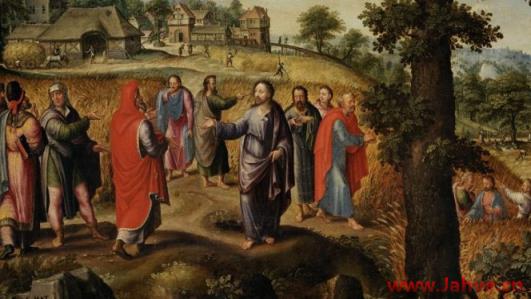 2018-7-21朋友们,在今天的福音中,我们读到依撒意亚先知的话:“看,我的仆人,他是我所拣选,我所钟爱的;他是我心灵所喜悦的。”这句话回应了耶稣的洗礼。在希腊哲学传统中,天主是宇宙万物围绕的至善中心。但要亚里士多德的创始者弯腰迁就受造物并与之靠近,那是不可思议的。而犹太人一直都把天主绝对的圣洁与人类的罪恶相比较。但要天主亲自来承受受造物的卑劣并与之并肩而立——绝不可能。然而,在基督里,天主亲自向受造物靠近,承担起他们的卑劣,并与他们并肩而立。为什么?因为天主是为宽恕罪恶而来的。这就是基督教启示彻头彻尾的核心。耶稣是多么经常说出宽恕的话语和作出宽恕的姿势啊!还有宽恕对于圣餐仪式是多么重要啊!“这是我的血…为大众倾流,以赦免罪过。”Friends, in today’s Gospel we hear a passage from Isaiah echoing the Baptism of Jesus: "Here is my servant, whom I have chosen, my beloved, with whom my soul is well pleased."In the Greek philosophical tradition, God is the supreme good around which everything in the universe revolves. But that Aristotle’s prime mover would stoop down to the level of a creature and move toward him—that would be unthinkable. And in the Jewish context, God’s absolute holiness was consistently contrasted with human sinfulness. But that God would himself take on the wretchedness of his creatures and stand with them—no way.Yet, in Christ, God himself moves toward his creatures, takes on their wretchedness, and stands with them. Why? Because God has come in order to forgive sins. This is the heart and soul, the beginning and end of Christian revelation. How often the words and gestures of forgiveness radiate out from Jesus, and how central forgiveness is to the liturgy. "This is the cup of my blood…which will be shed so that sins may be forgiven."This is why "he will not break a bruised reed or quench a smoldering wick." God has not come to finish off those who have blown it spiritually and morally, but to stand with them in total solidarity.
2018-7-21朋友们,在今天的福音中,我们读到依撒意亚先知的话:“看,我的仆人,他是我所拣选,我所钟爱的;他是我心灵所喜悦的。”这句话回应了耶稣的洗礼。在希腊哲学传统中,天主是宇宙万物围绕的至善中心。但要亚里士多德的创始者弯腰迁就受造物并与之靠近,那是不可思议的。而犹太人一直都把天主绝对的圣洁与人类的罪恶相比较。但要天主亲自来承受受造物的卑劣并与之并肩而立——绝不可能。然而,在基督里,天主亲自向受造物靠近,承担起他们的卑劣,并与他们并肩而立。为什么?因为天主是为宽恕罪恶而来的。这就是基督教启示彻头彻尾的核心。耶稣是多么经常说出宽恕的话语和作出宽恕的姿势啊!还有宽恕对于圣餐仪式是多么重要啊!“这是我的血…为大众倾流,以赦免罪过。”Friends, in today’s Gospel we hear a passage from Isaiah echoing the Baptism of Jesus: "Here is my servant, whom I have chosen, my beloved, with whom my soul is well pleased."In the Greek philosophical tradition, God is the supreme good around which everything in the universe revolves. But that Aristotle’s prime mover would stoop down to the level of a creature and move toward him—that would be unthinkable. And in the Jewish context, God’s absolute holiness was consistently contrasted with human sinfulness. But that God would himself take on the wretchedness of his creatures and stand with them—no way.Yet, in Christ, God himself moves toward his creatures, takes on their wretchedness, and stands with them. Why? Because God has come in order to forgive sins. This is the heart and soul, the beginning and end of Christian revelation. How often the words and gestures of forgiveness radiate out from Jesus, and how central forgiveness is to the liturgy. "This is the cup of my blood…which will be shed so that sins may be forgiven."This is why "he will not break a bruised reed or quench a smoldering wick." God has not come to finish off those who have blown it spiritually and morally, but to stand with them in total solidarity.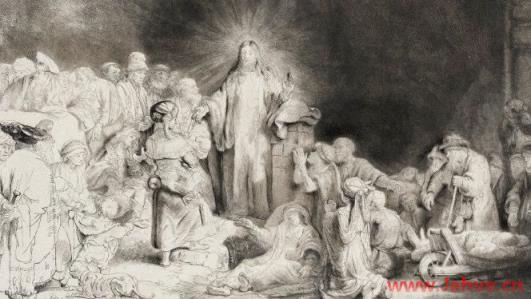 2018-7-22朋友们,今天的福音说到耶稣垂怜荒野中的群众。“耶稣一下船,看见一大伙群众,就对他们动了怜悯的心,因为他们好像没有牧人的羊,遂开口教训他们许多事。”这就像逃离埃及、流落荒野的以色列人那样,与世隔绝、孤立无援、心怀恐惧和揭不开锅,当时人们强烈要求梅瑟想办法。今天的福音中,我们看到的是一群极度饥渴的人和一位面对死亡威胁的先知。围在死亡威胁下的耶稣身边的这群人象征着教会。我们因为饥渴而来到他身边,即使四下荒凉,我们也不离不弃。因此,“已压破的芦苇,他不折断;将熄灭的灯心,他不吹灭。”天主不是来毁灭那些在精神上和道德上失足的人,而是来与他们并肩而立,完全休戚与共。Friends, today’s Gospel shows Jesus’ compassion for the multitude in the desert. "When he disembarked and saw the vast crowd, his heart was moved with pity for them, for they were like sheep without a shepherd; and he began to teach them many things."There is the motif of the people Israel in the desert after their escape from Egypt. Isolated, alone, afraid, and without food, they clamored for something from Moses. Here we see people who are dying to be fed, and a prophet who is under threat of death. This crowd around the threatened Jesus is a metaphor for the Church. We have come to him because we are hungry, and we stay even when things look bleak.
2018-7-22朋友们,今天的福音说到耶稣垂怜荒野中的群众。“耶稣一下船,看见一大伙群众,就对他们动了怜悯的心,因为他们好像没有牧人的羊,遂开口教训他们许多事。”这就像逃离埃及、流落荒野的以色列人那样,与世隔绝、孤立无援、心怀恐惧和揭不开锅,当时人们强烈要求梅瑟想办法。今天的福音中,我们看到的是一群极度饥渴的人和一位面对死亡威胁的先知。围在死亡威胁下的耶稣身边的这群人象征着教会。我们因为饥渴而来到他身边,即使四下荒凉,我们也不离不弃。因此,“已压破的芦苇,他不折断;将熄灭的灯心,他不吹灭。”天主不是来毁灭那些在精神上和道德上失足的人,而是来与他们并肩而立,完全休戚与共。Friends, today’s Gospel shows Jesus’ compassion for the multitude in the desert. "When he disembarked and saw the vast crowd, his heart was moved with pity for them, for they were like sheep without a shepherd; and he began to teach them many things."There is the motif of the people Israel in the desert after their escape from Egypt. Isolated, alone, afraid, and without food, they clamored for something from Moses. Here we see people who are dying to be fed, and a prophet who is under threat of death. This crowd around the threatened Jesus is a metaphor for the Church. We have come to him because we are hungry, and we stay even when things look bleak.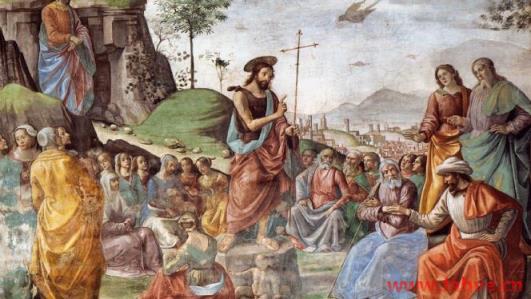 2018-7-23朋友们,在今天的福音中,一些法利塞人要求耶稣给他们显示一个征兆。耶稣回答道:“邪恶淫乱的世代要求征兆,但除了约纳先知的征兆外,必不给它其他的征兆”。约纳曾在大鱼腹中度过了三天三夜。天主叫约纳劝喻尼尼微人悔改。尼尼微是个庞大的城市,据说步行穿越该市需耗时三天。我不禁把尼尼微想象为当今繁荣兴旺、五光十色的现代化大都市之一。尼尼微悔改的表现是什么?皈依天主、把天主尊为唯一恒久不变的善。听到约纳的劝喻后,尼尼微人“立即宣布禁食,从大到小,都身披苦衣。” 为什么他们要这样清心寡欲?因为要戒掉对物质享乐的依恋。超脱于你现有的心智、忏悔改过、把生活过得就像世间一切终究都是无关重要的那样,你就会活在天国之中!Friends, today in our Gospel some Pharisees ask Jesus for a sign. And Jesus replies, “An evil and unfaithful generation seeks a sign, but no sign will be given it except the sign of Jonah the prophet,” who was in the belly of the whale for three days and nights.Jonah was called by God to preach conversion to Nineveh, which is described as an enormously large city. It took, they said, three days to walk through it. I can’t help but think of Nineveh as one of our large, modern cities, a center of all sorts of worldly activity and preoccupation.What would its conversion look like? A turning back to God as the only enduring good. After hearing the word of Jonah, the Ninevites “proclaimed a fast, and all of them, great and small, put on sackcloth.” What is the purpose of these ascetic practices? To wean people away from an attachment to worldly pleasures.Go beyond the mind that you have. Repent. Live as though nothing in this world finally matters. And you will be living in the Kingdom of God!
2018-7-23朋友们,在今天的福音中,一些法利塞人要求耶稣给他们显示一个征兆。耶稣回答道:“邪恶淫乱的世代要求征兆,但除了约纳先知的征兆外,必不给它其他的征兆”。约纳曾在大鱼腹中度过了三天三夜。天主叫约纳劝喻尼尼微人悔改。尼尼微是个庞大的城市,据说步行穿越该市需耗时三天。我不禁把尼尼微想象为当今繁荣兴旺、五光十色的现代化大都市之一。尼尼微悔改的表现是什么?皈依天主、把天主尊为唯一恒久不变的善。听到约纳的劝喻后,尼尼微人“立即宣布禁食,从大到小,都身披苦衣。” 为什么他们要这样清心寡欲?因为要戒掉对物质享乐的依恋。超脱于你现有的心智、忏悔改过、把生活过得就像世间一切终究都是无关重要的那样,你就会活在天国之中!Friends, today in our Gospel some Pharisees ask Jesus for a sign. And Jesus replies, “An evil and unfaithful generation seeks a sign, but no sign will be given it except the sign of Jonah the prophet,” who was in the belly of the whale for three days and nights.Jonah was called by God to preach conversion to Nineveh, which is described as an enormously large city. It took, they said, three days to walk through it. I can’t help but think of Nineveh as one of our large, modern cities, a center of all sorts of worldly activity and preoccupation.What would its conversion look like? A turning back to God as the only enduring good. After hearing the word of Jonah, the Ninevites “proclaimed a fast, and all of them, great and small, put on sackcloth.” What is the purpose of these ascetic practices? To wean people away from an attachment to worldly pleasures.Go beyond the mind that you have. Repent. Live as though nothing in this world finally matters. And you will be living in the Kingdom of God!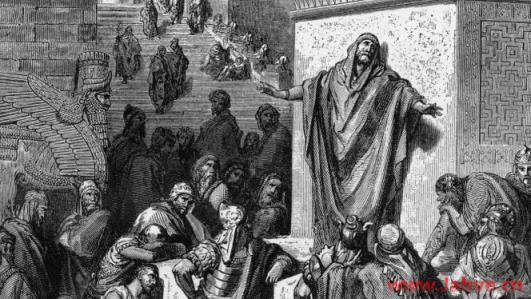 2018-7-24朋友们,在今天的福音中,有人告诉耶稣:“你的母亲同你的兄弟站在外边,想要同你说话。” 耶稣伸出他的手,指著自己的门徒说:“看!我的母亲,我的兄弟!不拘谁遵行我在天之父的意旨,他就是我的兄弟、姊妹和母亲。”家庭很好。培育子女、以家人为豪并没有错。但《圣经》一次又一次地对世俗的美好提出疑问——甚至包括家庭关系这么好的事情。为什么?因为家庭不是天主。家庭不应是你全心服务的对象;家庭不是你人生的中心。你日常围绕的中心是家庭吗?家庭是你每天最主要的关注点吗?你是不是有时会觉得家庭的责任与天主的意旨相违?那么就记住耶稣的说话:“谁是我的母亲?谁是我的兄弟?不拘谁遵行我在天之父的意旨,他就是我的兄弟、姊妹和母亲。”Friends, in today’s Gospel, someone tells Jesus, "Your mother and your brothers are standing outside, asking to speak with you." Jesus stretches his hand toward his disciples and says, "Here are my mother and my brothers. For whoever does the will of my heavenly Father is my brother, and sister, and mother."Family is wonderful. There is nothing in the world wrong with fostering the flourishing of your family. But over and again, the Bible places the goods of the world into question—even something as good as family relationships.Why? Because family isn’t God. It is not that which you should serve with your whole heart; it doesn’t belong in the center of your life.Is family the point around which most of your energies revolve? Is it your primary focus as you make your way through the day? Are there times when you feel your family obligations competing with the will of God?Then remember Jesus’ words: "Who is my mother? Who are my brothers?...Whoever does the will of my heavenly Father."
2018-7-24朋友们,在今天的福音中,有人告诉耶稣:“你的母亲同你的兄弟站在外边,想要同你说话。” 耶稣伸出他的手,指著自己的门徒说:“看!我的母亲,我的兄弟!不拘谁遵行我在天之父的意旨,他就是我的兄弟、姊妹和母亲。”家庭很好。培育子女、以家人为豪并没有错。但《圣经》一次又一次地对世俗的美好提出疑问——甚至包括家庭关系这么好的事情。为什么?因为家庭不是天主。家庭不应是你全心服务的对象;家庭不是你人生的中心。你日常围绕的中心是家庭吗?家庭是你每天最主要的关注点吗?你是不是有时会觉得家庭的责任与天主的意旨相违?那么就记住耶稣的说话:“谁是我的母亲?谁是我的兄弟?不拘谁遵行我在天之父的意旨,他就是我的兄弟、姊妹和母亲。”Friends, in today’s Gospel, someone tells Jesus, "Your mother and your brothers are standing outside, asking to speak with you." Jesus stretches his hand toward his disciples and says, "Here are my mother and my brothers. For whoever does the will of my heavenly Father is my brother, and sister, and mother."Family is wonderful. There is nothing in the world wrong with fostering the flourishing of your family. But over and again, the Bible places the goods of the world into question—even something as good as family relationships.Why? Because family isn’t God. It is not that which you should serve with your whole heart; it doesn’t belong in the center of your life.Is family the point around which most of your energies revolve? Is it your primary focus as you make your way through the day? Are there times when you feel your family obligations competing with the will of God?Then remember Jesus’ words: "Who is my mother? Who are my brothers?...Whoever does the will of my heavenly Father."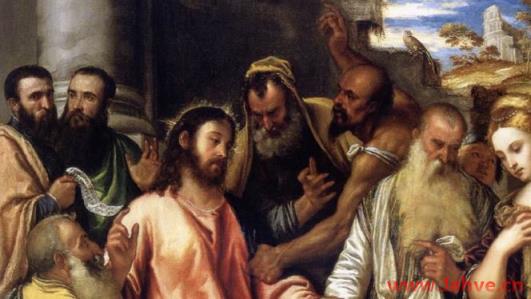 2018-7-25朋友们,在今天的福音中,雅各伯和若望的母亲替他们兄弟俩向耶稣请求在天国中获得上等的地位。啊,这是野心勃勃的声音。有些人根本不在乎钱财、权势或享乐——但热衷于名誉。很多人跟雅各伯和若望一样,都想在社会中飞黄腾达、有所作为。或许此文的读者中有不少人都有着共鸣。但耶稣反客为主地说:“你们不知道你们所求的是什么”。他确实贵为君王,将统领以色列,但他将以荆棘加冕,而他的宝座将是一副古罗马帝国的刑具。因而,他试着说得明白一点:“你们能饮我将要饮的爵吗?或者像我那样受洗吗?” 在天国中获得荣誉的关键在于饮尽一杯苦酒、甘愿为爱而受难、奉献出自己的生命。看看圣人们的做法。我们要做的不是扩张自我,而是掏空自我。Friends, today in our Gospel the mother of James and John asks Jesus on their behalf for high places of authority in his kingdom. Ah, there is the voice of ambition. Some people don’t care at all about money or power or pleasure—but they care passionately about honor. A lot of people can identify with James and John. They want to go places, they want to be movers and shakers in society. Perhaps a number of people reading this reflection are filled with these emotions.But Jesus turns the tables on them: "You do not know what you are asking." He is indeed a King, and he will indeed rule Israel, but his crown will be made of thorns, and his throne will be a Roman instrument of torture.And so he tries to clarify: "Can you drink the cup that I drink or be baptized with the baptism with which I am baptized?" The key to honor in the kingdom of God is to drink the cup of suffering, to be willing to suffer out of love, to give one’s life away as a gift. Look at the lives of the saints. It is not about aggrandizing the ego, but emptying it out.
2018-7-25朋友们,在今天的福音中,雅各伯和若望的母亲替他们兄弟俩向耶稣请求在天国中获得上等的地位。啊,这是野心勃勃的声音。有些人根本不在乎钱财、权势或享乐——但热衷于名誉。很多人跟雅各伯和若望一样,都想在社会中飞黄腾达、有所作为。或许此文的读者中有不少人都有着共鸣。但耶稣反客为主地说:“你们不知道你们所求的是什么”。他确实贵为君王,将统领以色列,但他将以荆棘加冕,而他的宝座将是一副古罗马帝国的刑具。因而,他试着说得明白一点:“你们能饮我将要饮的爵吗?或者像我那样受洗吗?” 在天国中获得荣誉的关键在于饮尽一杯苦酒、甘愿为爱而受难、奉献出自己的生命。看看圣人们的做法。我们要做的不是扩张自我,而是掏空自我。Friends, today in our Gospel the mother of James and John asks Jesus on their behalf for high places of authority in his kingdom. Ah, there is the voice of ambition. Some people don’t care at all about money or power or pleasure—but they care passionately about honor. A lot of people can identify with James and John. They want to go places, they want to be movers and shakers in society. Perhaps a number of people reading this reflection are filled with these emotions.But Jesus turns the tables on them: "You do not know what you are asking." He is indeed a King, and he will indeed rule Israel, but his crown will be made of thorns, and his throne will be a Roman instrument of torture.And so he tries to clarify: "Can you drink the cup that I drink or be baptized with the baptism with which I am baptized?" The key to honor in the kingdom of God is to drink the cup of suffering, to be willing to suffer out of love, to give one’s life away as a gift. Look at the lives of the saints. It is not about aggrandizing the ego, but emptying it out.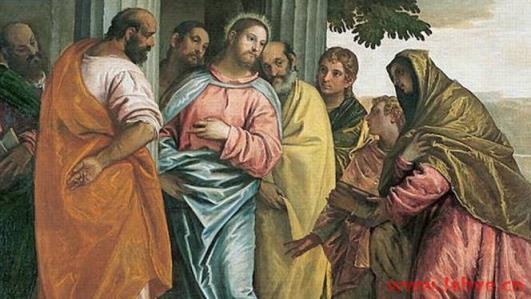 2018-7-26朋友们,在今天的福音中,门徒问耶稣为什么要用比喻对群众讲话。耶稣用这些具有煽动性又令人费解的故事和意象来解释天国,这似乎是祂偏爱的布道方式。祂回答说:“为此,我用比喻对他们讲话,是因为’他们看,却看不见;听,却听不见,也不了解’”。换句话说,因为群众拒绝相信祂及祂说的话。很多比喻都是奇怪的,一开始就令人反感、令人费解的。当然,使用比喻的目的就是要使我们烦恼、找不着北、困惑不已。耶稣的布道确实就有这些特点!祂绝少以教条形式来铺叙,而是更喜欢讲述这些使人莫名其妙的古怪故事。为什么?因为很多时候辩论无法充分阐明的真理却可以通过故事揭示出来。Friends, today in our Gospel the disciples ask Jesus why he speaks to the crowds in parables.Jesus is explaining the Kingdom of God in these provocative and puzzling stories and images that seemed to be his preferred way of preaching. And he replies to his disciples, “This is why I speak to them in parables, because ‘they look but do not see and hear but do not listen or understand.’” In other words, because the crowds refused to believe in him and what he has to say.Many parables are strange and initially off-putting and puzzling. Of course, that is the point of parables: to bother us, throw us off base, confuse us a bit. How characteristic this was of Jesus’ preaching! He rarely lays things out in doctrinal form: he prefers to tell these puzzling, funny stories. Why? Because in many cases stories reveal truth that arguments can’t quite capture.
2018-7-26朋友们,在今天的福音中,门徒问耶稣为什么要用比喻对群众讲话。耶稣用这些具有煽动性又令人费解的故事和意象来解释天国,这似乎是祂偏爱的布道方式。祂回答说:“为此,我用比喻对他们讲话,是因为’他们看,却看不见;听,却听不见,也不了解’”。换句话说,因为群众拒绝相信祂及祂说的话。很多比喻都是奇怪的,一开始就令人反感、令人费解的。当然,使用比喻的目的就是要使我们烦恼、找不着北、困惑不已。耶稣的布道确实就有这些特点!祂绝少以教条形式来铺叙,而是更喜欢讲述这些使人莫名其妙的古怪故事。为什么?因为很多时候辩论无法充分阐明的真理却可以通过故事揭示出来。Friends, today in our Gospel the disciples ask Jesus why he speaks to the crowds in parables.Jesus is explaining the Kingdom of God in these provocative and puzzling stories and images that seemed to be his preferred way of preaching. And he replies to his disciples, “This is why I speak to them in parables, because ‘they look but do not see and hear but do not listen or understand.’” In other words, because the crowds refused to believe in him and what he has to say.Many parables are strange and initially off-putting and puzzling. Of course, that is the point of parables: to bother us, throw us off base, confuse us a bit. How characteristic this was of Jesus’ preaching! He rarely lays things out in doctrinal form: he prefers to tell these puzzling, funny stories. Why? Because in many cases stories reveal truth that arguments can’t quite capture.

微信小程序
微信扫一扫体验

微信公众账号
微信扫一扫加关注
顶部
